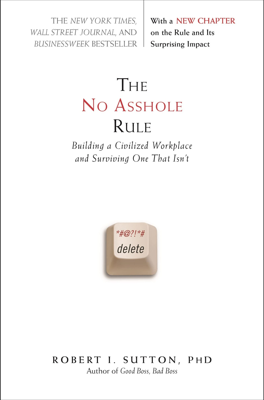How to Stop Your “Inner Jerk” From Getting Out
Managing Your Inner Jerk
Even well-intentioned individuals can exhibit asshole behavior under stressful conditions. Viewing asshole behavior as a communicable disease is a key step towards managing one's inner jerk and preventing its spread.
Emotional Contagion
- Negative emotions are highly contagious.
- Displaying disdain or anger can trigger similar behavior in others, creating a vicious cycle.
- Studies show that people tend to mimic the aggressive behavior of dominant leaders or colleagues.
Avoiding Asshole Poisoning
Choose Your Environment Wisely
- Assess Potential Workplaces: Evaluate colleagues' behavior before taking a job. Avoid environments with self-centered, nasty, or overworked individuals.
- Leonardo da Vinci’s Rule: It is easier to resist toxic environments at the beginning.
Walk Out or Limit Contact
- If already in a toxic environment, leaving is the best option.
- If leaving isn’t feasible, limit interactions with the worst offenders to minimize exposure to negative behavior.
- Use avoidance tactics to reduce your contact with known assholes at work.
Managing Competitive Impulses
Dangerous Rivalries
- Seeing coworkers as rivals can exacerbate negative behavior.
- Pure competition can degrade organizational effectiveness and personal well-being.
Cooperative Framing
- Language Matters: Using words that promote cooperation over competition can lead to better interactions and organizational performance.
- Focus on the commonalities and humanity that link all individuals.
- Embrace a mindset of having "enough," as highlighted in Kurt Vonnegut’s poem about Joe Heller.
Self-Awareness and Behavior Change
See Yourself as Others Do
- Assessing your behavior based on how others view you is essential.
- Tools like 360-degree evaluations can provide comprehensive feedback.
- Frequent, honest appraisals can help identify and correct destructive behaviors.
Face Your Past
- Past behavior is a significant predictor of future actions.
- Understanding personal history, such as tendencies to bully or grow up in a "culture of honor," can help manage current behavior.
Asshole Audit
- Conduct regular self-assessments and solicit feedback from others to gauge if your behavior is problematic.
- Use tools like the "Self-Test: Are You a Certified Asshole?" to measure your behavior.
- Serious self-reflection and acknowledgment of one's flaws are crucial steps towards improvement and maintaining a respectful demeanor.
Conclusion
Effective self-management includes being aware of environments and conditions that trigger asshole behavior, fostering cooperative attitudes, and continuously evaluating and correcting one’s actions.
